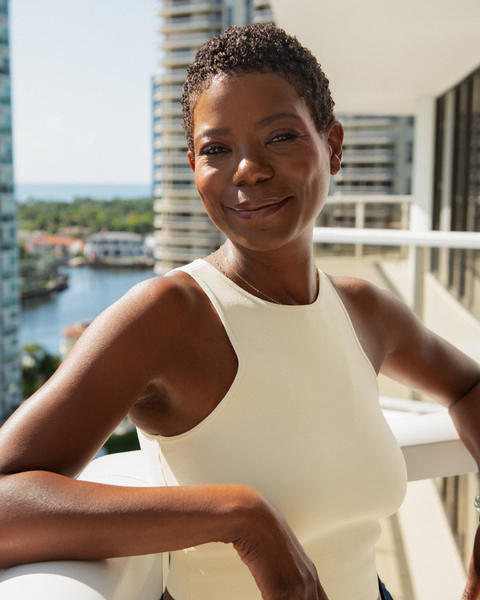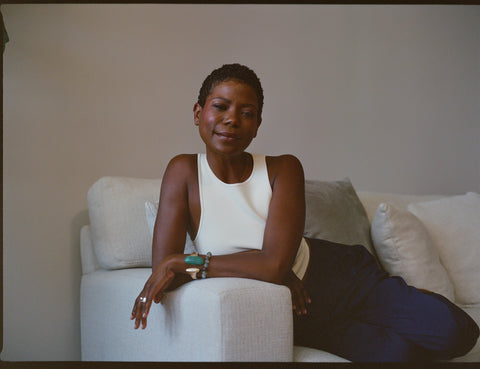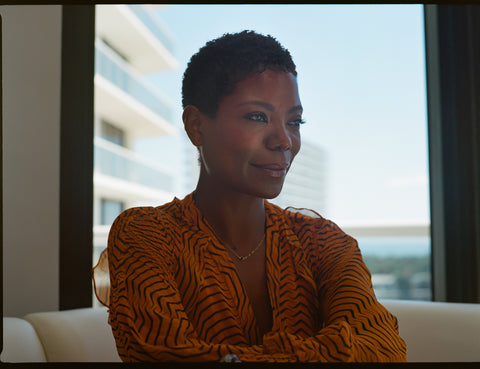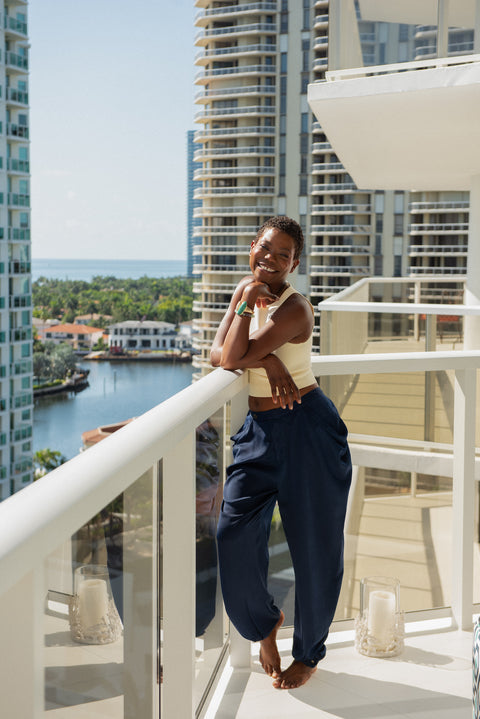Welcome to Good People, an interview series featuring those who inspire us and keep us forever excited for the future. This month's Person is Bridgette Hill, a hair colorist-turned certified trichologist who’s known as The Scalp Therapist. We caught up with Bridgette in Florida to learn about her 25-year career path—and about her process of healing, finding peace, and how scalp health is hair health. Read her full interview here:
Top of Mind
06.28.23
Good People: Bridgette Hill

By Crown Affair
- You’re based in Florida now—did you grow up there?
So I was born in Iowa, but my mother was born and raised in Florida and my father also grew up in Florida. My father was a football player and was recruited to the Miami Dolphins, so that's where I was raised after being born. Florida's my blood you know—but I did swear I would never come back here when I graduated. Life is a boomerang though right? So at my wise age I now know why I am a Florida girl. I love it, it is essential to my brain to connect with water, so I feel very blessed. Even though there are some crazy aspects to the state, there are also some really magical aspects to it that inspire me—the Florida lifestyle is very important to me and my rituals.
- Do you have a personal definition of ritual? If so, what is it?
You could say rituals are just anything that's repeated over a period of time. That's a very unconscious way of seeing ritual, because everyone probably has some routine that's very repetitive. But when you put a mindfulness to it, or a consciousness to the behaviors you repeat, I find they become more purposeful and more intentional. And then the result is that those behaviors create some type of internal feeling or some type of emotional feeling.
So for me, a ritual is any practice, where there's an awareness—you're making a conscious choice to say like, ‘I'm turning my phone off at a certain time,’ or: ‘I'm gonna tell my boyfriend, I love him,’ or: ‘I'm gonna make sure I floss my teeth.’ Whatever those little things are that you're doing with an intention of welcoming attention. For me, because of where I am in my life, I am working to live my life like a ritual. I’m bringing my authentic self to the conversation. And I'm here for that. I start my mornings either walking or running, no matter where I am. Then I typically try to do some type of yoga pose by the water—different positions that allow my body to open up, receive, and just be at peace.

- What does that look like on the day to day?
Yes, so honestly, I’m 49 years old. I'm a widow. And I’m 18 months into the healing process, so I’m at a point where I’m just being mindful of what it means to be my body. Like, ‘Oh my God, my feet feel great, my feet don't feel great, my neck feels great.’ Just that simple awareness. And then the fact that I'm feeling that allows me to recognize, ‘Oh, that's kind of cool.’ And then there is gratitude that comes with that. This awareness of my body helps me be aware of different feelings I’m experiencing without getting overwhelmed, and I can make decisions based on it. Like, ‘There's something going on there, let me be mindful of whether I should maybe not be driving as much today,’ or, ‘Maybe I need to take a yoga class today.’ Whatever it is, I try to just simplify things, and it has helped me turn my seconds to minutes, minutes to hours and hours and days and days to months. And all of that has just naturally benefitted different parts of myself, because I give myself the permission to be whatever it is I need to be on a given day. That's all very new for me, and I love the fact that that has become a part of how I'm existing in the world.
- I love that. Being in tune with yourself so that you can adjust your circumstances based on how you’re feeling.
And you know, I think being able to take that a little further. I'm nowhere near perfect—but it’s a mind shift. It’s the conscious decision to go inward, to make connections within yourself, so you can make more connections with other humans. And it's so nice to be with other human beings.


- Definitely. So tell me about your background. What did your career path look like?
I went to college for journalism and for writing. I thought I wanted to be a journalist, but I’m highly opinionated—clearly [laughs]. But I also always had an innate knack for beauty. So that was always just with me. I attended Clark Atlanta University which is a historically black college in Atlanta, Georgia. And it was this Mecca, where there were international people of color, global people of color, celebrities, kids, people of color… For me, it was a wake up for my identity. I was this dark skinned black girl from the South, and to see myself in so many different ways really impacted me. I think that was my first initiation into thinking more about beauty, and I would do makeup gigs here and there.
You remember when the Aveda movement hit the scene? I was very moved by their images. I think it was in ‘94, ‘95. I was in college and had switched from journalism to writing for radio, TV and film, and that got my creative juices flowing. Then I moved to New York in the late ‘90s. New York at that time was Steven Meisel, all the fashion weeks, Marc Jacobs, you name it. I was able to be part of that movement. And I loved every minute of it, not knowing that I was getting into the health side of it.
- How did that come about?
That just happened. So, I got married very young. I met my soulmate, the love of my life, who passed away unexpectedly in September 2021. We met in college, and we just kind of put ourselves on this journey of life, figuring it out. And that led us to New York: he had dreams in New York, I had dreams in New York. So at 25 when we landed there, I had a three year old. Being a young mom, I was so naive—I was really this old woman coming into this beauty world full of kids literally straight out of beauty school. I needed to survive, so I decided to become a colorist, because colorists made the money. Ideally, of course, I wanted to be on the creative side. But my priority as a mom always was first. But it was stressful, playing the New York game, and that stress led me to getting my own bald spots—I started getting alopecia. And I did not know what was going on.
At this time, I had a lot of hair and was now getting these huge bald spots. So I was going to get cortisone injections, because that's all we did was like ‘oh, you have some form of alopecia,’ put a needle in your head. I was doing that every three months. And then after a year of that I thought okay, what's really going on? And that started my journey into understanding the scalp. It was just me trying to solve my own problems as a 25 year old. But that's where this journey began. Here we are, two decades later.

- What did you find helped your alopecia?
Well, as a colorist, I've always been into healthy hair—I've always had this delicate appreciation for hair in and of itself. And I had developed quite a strong following and clientele, especially from clients who had put their hair through a lot of the strenuous things. At the time, we didn't have the science and technology for gentle hair treatments. Back then everything was very harsh. So in taking a healthier approach, making my own treatments, I was kind of accidentally creating healthy scalp conditions, not really knowing what I was doing. As I started looking for lines that would give the benefits I was looking for, that led me to Rene Furterer. They had this thing called a Capella scope—I don't know if anybody really understood what they were doing with this tool, but it looked cool. Basically, it magnifies the scalp. And I became obsessed with this process.
Then I was introduced to this hair oil called Complex 5, and I started using on my bald patches. I started going into my own spiritual journey and growth, going to yoga. I always had this mind/body/spirit understanding with me that I knew innately. But at that time, this new age, science, hippie, Bohemian, however they classified it made it so we were not able to talk about that in beauty at all. So I just kind of kept it to myself and talked about it in my chair and to other brands and people. And over time, through recognizing that some of the genetic things that my mom was going through were connected, led me to recognizing topicals that helped, finally led me to supplements. Viviscal was only legal in Europe at the time, you couldn’t even get it in the States. But all the assistants that were doing the fashion shows would literally go over and buy all the Viviscal they could find. I started taking Viviscal before was even legal in the United States because they would bring him back because all the models were taking it because of the imbalance. So—I know I’m dragging it out, but all these these dots were connecting at the same time. It was like all these little things happening. And then I wanted to dive deeper into it.
I had always known about different treatment places in New York. But none of the services that I experienced were very educational, or were even using great products. So I had to figure it out myself, right? And here we are.
- How did you actually either discover trichology as a profession? How did you end up deciding to pursue it full time?
I don't know if there was a moment that I said, ‘Aha!’ It’s intricate—trichology is still so new. And there's so much information, there's just so much that I do not know yet. I think it's a very humbling place to be in beauty, and I take that responsibility very seriously. Anecdotally, we know certain things—I am living proof—and we don’t need science and data to prove all of it. I get it. But I want to give the industry the respect to be able to back these things up with data and science. So I like to say that I'm still in training and learning, and I always will be. I do not know it all. But what I do offer is that all sorts of factors are ultimately going to impact the quality of your hair fiber and your scalp. And how the scalp and hair are interrelated is what is so exciting. That curiosity drives me on a daily basis.
Since I come from a beauty background, not only does it have to have efficacy and give a result, but they better make you look good, too, right? I think that's the part that is my uniqueness. There are some amazing trichologists out there and I think, collectively, what we're doing together with some great dermatologists and great brand founders is that we’re having conversations. It's pretty revolutionary. I hope we keep pushing the envelope and keep being courageous because this is necessary for us to really, ultimately give people the tools. Every tool is not for everyone, but there is a tool for everyone. And there is a ritual for everyone. And it really goes back to that connection to the self.

- How would you say your personal relationship with your hair has changed over time, especially as you've learned more about scalp health? How do you see your hair differently?
It’s big. I relaxed my hair for years. When my daughter was born and she had this beautiful little coil of hair, but she was fascinated with my hair when it was straight, which was disturbing to me. I was at Aveda in beauty school at the time, and I literally went in the bathroom and shaved all my hair. My husband was like, “I like it.” For the first time I connected to my hair texture, like, it was really curly, you know. As a kid I was always taught that my hair in its natural state was unruly, or not acceptable, or it needs to be into ponytails or it needs to be controlled. So it's really been a progression. Honestly, it was me learning how to love my hair. I'm disrupting, still, 25 years of that negative self-talk. I'm a wise woman now, and I give myself that credit, but don't get it twisted. There are still days I have to simmer down that inner child.
- Do you have advice you might give to other people who still experience that from time to time? Maybe there is a way it relates to the scalp, or maybe it's just a personal, more philosophical approach.
I think that the gentleness of this is something so interesting for me. Think of a bouquet. I don't know where I got this, but it resonated with me so profoundly. When we see bouquets, like a floral arrangement, you get these eclectic, beautiful arrangements of flowers. We see how unique and amazing and beautiful they are, collectively. Why don't we apply that same concept to human beings? We can find unique value in each one of those without dismantling or having to tear one down to build one up—they can equally exist.
How can we apply that same concept to the physical manifestations of ourselves? I think that when we are able to do that, then you cannot but recognize your own beauty and your uniqueness. This is me, and who is offering me the best solution to manage me, who is offering me the best approach to deal with what I have. We have choices, it's not a what is wrong with me, it's who cares enough about what my concerns are? That, hey, you know, it's paid, we're out here. And I think, when we're able to see that we are being seen, that's where beauty fails us at times, is that for some reason, there seems to be a value proposition on coming off of people's fear. And I'm like, just over that. And I refuse to play Kate into that, because we're so abundant and uniquely beautiful and uniquely needing the same shit and different things.
Everyone needs lipids, moistures and proteins for their hair. I don't care what ethnicity you are, right? It's just they're gonna be different delivery systems at different times that are going to work for you. At some times you and I Anna could use the same product. It's just, it's like anything else. Right. So I think it's more about being genuinely grateful for your uniqueness and value that suggests a product out there for you. There's a tool out there for you. There's a heating element out there for you. somebody's paying attention to you and empower yourself with that information. I think that That is how a more a healthier place to approach beauty. Because then you get to see that there are you are seeing. Yeah. And everybody wants to see like, I don't care what we say everybody wants to feel like someone. That's the human experience, right? We want our reflection and be like, Oh, I see you. Like, you know what I mean?
- Yes exactly. Other people's beauty doesn't take away from yours.
It's even more magical because you get to see so many reflections of it. That's amazing.

- What is your haircare routine on a day to day? How do you take care of your scalp? How do you take care of your hair?
I literally cut my hair every day. I use whatever sharp thing is there and just kind of cut away at my curl. I may do a real haircut once a year.
When it comes to caring for my hair, it is a completely different ballgame, because I do deal with issues. So during stress periods, I'm going to always have bouts of stress-induced alopecia. I have accepted it, it's real, it comes and goes. But I’ve gotten back every patch, even if it is a bit thinner in some places. I'm committed to my routine for myself because I love that my body keeps responding for me.
Internally, I always take my supplements. Topically I do a low-light laser therapy, and my own microneedling. But there are periods of time where I don't do that. And I will say my body still responds because I do pay real attention to those internal areas I tend to be deficient in, like Vitamin D.
I rinse my scalp every day with water—multiple times a day. I love a very lightweight Leave-In conditioner. I’ll style with a flexible gel, and I wear scarves a lot. I think sometimes the scarves make me feel like I have hair. I get to have this feeling of being a little bit more feminine. I shampoo, and I experiment with a lot of moisture-based masks, and I color my hairline. I'm very gray, but I cover-color my hairline probably every 10 to 17 days. I think of it like a mascara or eyeshadow. But you name it—oils, mask potions—I do it.
- Is there a reason why you'd recommend rinsing your scalp every day?
For me, I find and because I know that I have androgenic, and what can be scarring, alopecia, I just love the idea of rinsing to keep my scalp debris free. Sometimes I'll use hyaluronic acid rinses, or some vinegar based rinses, depending on what my ritual may be for that week or that month. It could be based on my diet, if I feel like I've been drinking a lot, traveling a lot, under-eating, I try to be mindful of what my body is going through. And then I have all these different little rituals, I guess for those moments. That's why I said there's a need for all these things. Because once you know your body's like, oh you have like, this is my every three month routine or this is my every week ritual, you really start to get a flow going and it's pretty beautiful because the body is going to respond.

- Are there specific types of foods that you'd recommend eating that are good for your hair?
You want all dark green leafy vegetables. Spinach, kale, a lot of anti-inflammatory protein is essential. Salmon is a great. Again, it’s all the same things that are great for the body. And I know this sounds so repetitive and so cliche, but remember that your hair fiber is just an extension of the cells that are restoring your vital organs. If your vital organs are not at play, and not at their best, they're going to compete with the production of your hair. So you know when your body's at its healthiest. And let me also put a side note to that. In general, yes, keep your body healthy. But specifically, you've got to know what your body needs individually, too. Which is why it's good to eat what you crave and when you're hungry—your body's talking to you. Your body’s health is the biggest benefactor to your hair health. That's why the ritual aspect is so important, because that's being in tune with yourself and being able to know what you need when you need it.
- INTERVIEWED BY:
Anna Jube, Crown Affair Brand Manager. Photographed by David Cortes.

